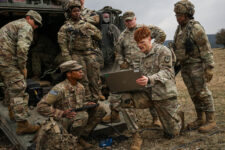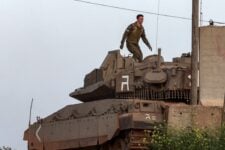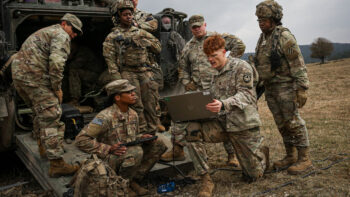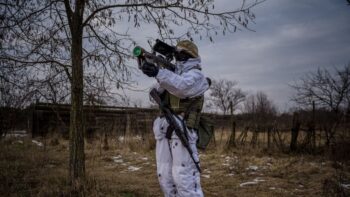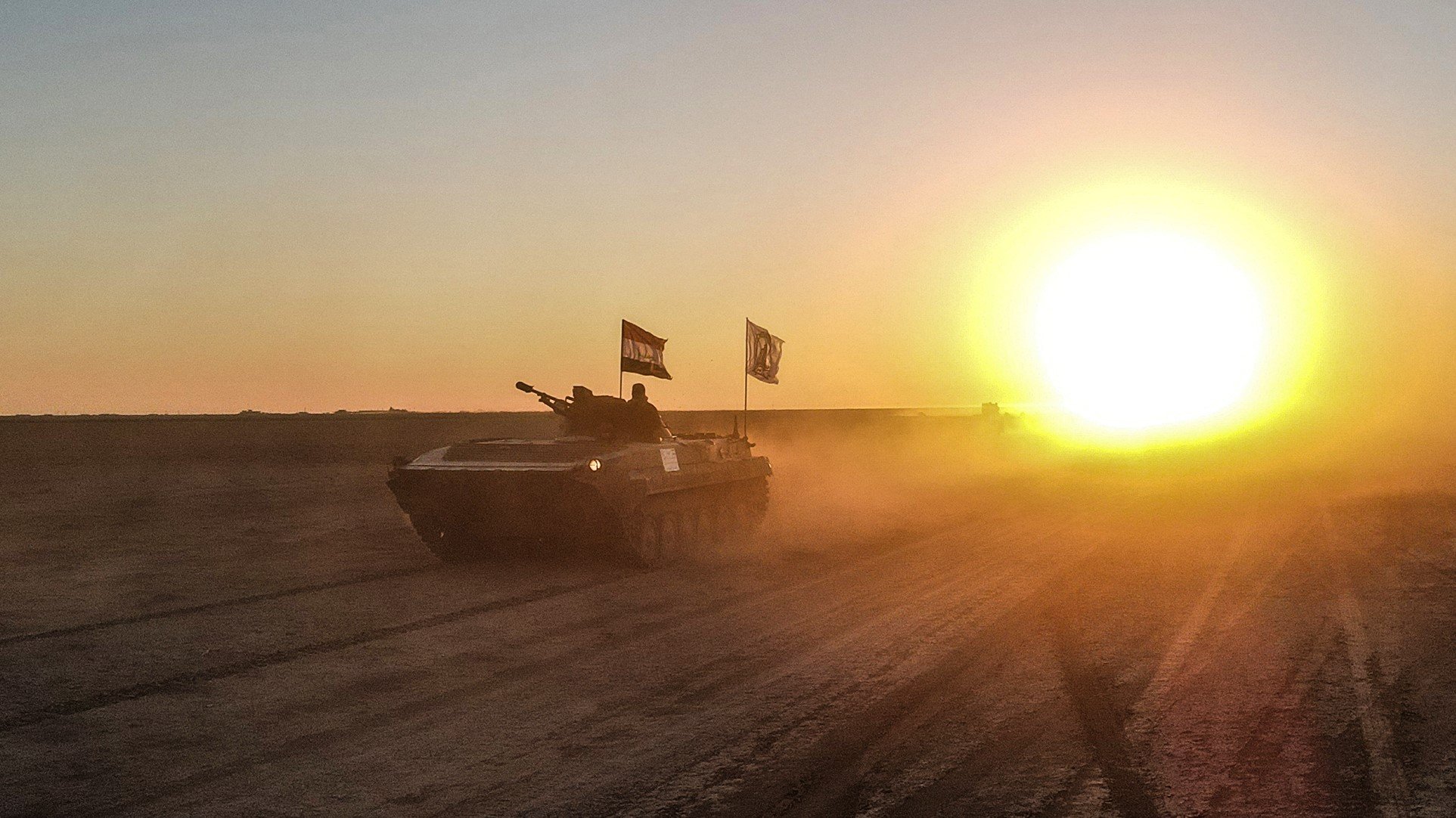
Iraqi military vehicles take part in an search operation for suspected jihadists in the northern Iraqi province of Nineveh, at sunrise on March 29, 2022. (ZAID AL-OBEIDI/AFP via Getty Images)
BEIRUT: As Iraq moves forward with plans to purchase advanced artillery from the United States and France, while also seeking procurement of Rafale fighter jets, questions are rising about its ability to fund these contracts with a caretaker government and other urgent priorities.
On May 8, the Iraqi Ministry of Defense revealed it was signing contracts with US and France to import advanced weapons and enhance the quality of its artillery.
As is typical for Iraq, there was little information announced about the specific systems, the cost or the timeline for delivery. Almost all the information about the agreements came from the commander of the artillery class in the ministry, Maj. Gen. Abed Al-Ardawi, who told the Iraqi News Agency (INA) that the contracts were concluded “to import advanced weapons, including artillery, which has proven efficiency recently in all battles against ISIS.”
He added that Iraq continues to import long-range cannons to target enemies at long distances, saying “The import of new guns will be part of the agreements with European countries.”
But with the absence of an effective government, experts don’t expect these contracts to see light. In October 2021, Iraq held parliamentary elections and no cabinet was formed since, leaving a caretaker government running the country.
Military expert and retired Iraqi brigadier Adnan Al Kenany told Breaking Defense that not much is known about these artillery systems that are supposedly going to be procured, and added that “Contracting is not among the duties of the caretaker government.”
And Iraq has more stressing issues than boosting its defense capabilities, Ahmad Al Sherify, an Iraqi strategic and defense expert, told Breaking Defense.
“Infrastructure and the reconstruction of destroyed cities are priorities that may drain the budget. That’s why funding the defense purchases including air defense systems may not be an easy mission,” Al Sherify said.
He added that the budget is a dilemma in Iraq. “We are facing more urgent needs than raising spending on armaments, and Iraq may compensate its defense needs with alliances it has. For instance, since Iraq is an ally of the international coalition, it is possible to borrow some capabilities to carry out some tasks that require capabilities not available nationally in order to neutralize the threats.”
There is, he said, a fine line between sustainable development programs and increasing military spending, one the new government should not surpass in order to avoid a political crisis.
Air Defense Needs
Aside from Al-Ardawi’s claims that the deals cover “artillery,” experts were left to guess at what might be included in the arms package, should it come to fruition.
Al Sherify expects that Iraq would look to procure additional C-RAM anti-rocket systems to procure its own airspace. The usefulness of that capability is easy to spot: in January, US C-RAM anti-rocket systems took down missiles fired by “terrorists” at the American Embassy in Baghdad.
“It is possible for Iraq, in the next government program to procure these air defense systems, since they are cost effective in targeting drones. Additionally, the country needs to procure long-range and medium-range radars from France to enhance air and radar monitoring, and then air defense systems. All these contracts are pending waiting for the next government to be formed.”
Al Kenany stressed the increasing importance to boost Iraqi air defense systems. “Regarding the increasing purchase of air defense systems, it came after the Turkish transgressions in the Iraqi airspace and the repeated violations of the Iraqi airspace. The Iraqi military forces possess the personnel to confront and fight, but lack armament, training, equipment.”
For best results, he said, Iraq should seek to deploy detection radars and air defense systems largely on its borders — whether they be American made or come from another source, such as Russia
Underlining the air defense need: on Monday, five missiles hit the Ain al-Asad base hosting US troops in the country’s western. Earlier in January this same year, two armed drones were shot down as they approached the same military base. In 2021 at least six drone attacks took place against U.S. and coalition forces in Iraq.
Meanwhile, the Iraqi Air Force continues to follow a plan to purchase 14 French Rafale fighter jets at a cost of $240 million, which will be paid in oil rather than cash. In September 2021, the chairman of the Security and Defense Committee of Iraq’s parliament, Mohammed Redha al-Haidar, revealed Baghdad and Paris had signed a contract for the aircraft.
NATO Training
Earlier this month, Iraqi Minister of Defense Juma Inad discussed ways to provide training support in with Commander of NATO’s mission in Iraq, Maj. Gen. Giovanni Iannucci.
NATO Mission Iraq (NMI) is a non-combat training and capacity building mission designed to help Iraqi forces prevent the return of ISIS and was launched in 2018 after the NATO Training and Capacity Building for Iraq mission was completed.
Al Sherify said that such training is a part of the attempts by the United States to develop military cooperation between Iraq and others in the region.
Ideally, “It will be something similar to a NATO, and this idea was discussed in the tripartite meeting between Egypt, Jordan and Iraq, to form a regional NATO. It will be an army integrating capabilities between the three countries, and the rest of the countries will join it, with their armament capabilities, to achieve what is called regional self-protection,” Al Sherify told Breaking Defense.
These training exercises will highlight interoperability between the participating countries and complements their armament capabilities, in terms of type and in terms of the nature of the combat missions.
In June 2021, a tripartite summit between Egypt’s President Abdel Fattah al-Sisi, Jordan’s King Abdullah II and Iraq’s president Barham Saleh was held in Baghdad.
Saleh said the meeting was “an eloquent message amid enormous regional challenges.” While Kadhemi’s office said then that the summit addressed topics including political and economic cooperation, in particular strengthening investment, and “joint efforts in the fight against terrorism.”
That still leaves quite a way to go before any sort of permanent military coalition — let alone the idea of a regional alliance where members pledge to come to each other’s aid if attacked — can be formed. But strengthening those relationships would give Iraq one more way to have others fill capability gaps, and perhaps relieve some of the budgetary pressure on Baghdad.
Sullivan says Ukraine supplemental should cover all of 2024, long-range ATACMS now in Ukraine
“We now have a significant number of ATACMS coming off their production line and entering US stocks,” Jake Sullivan said today. “And as a result, we can move forward with providing the ATACMS while also sustaining the readiness of the US armed forces.”






